Chapter 3
COVERINGS
![]()
As we examine this matter, a remarkable pattern develops which we find is repetitive in all four cases. The similarities in these reveal what we could call a "way" of Yahweh, or His government. It is significant that in each case where coverings are addressed – coverings are always present in pairs. In other words, there are two coverings over the object being covered. We also find that the first covering is physical, while the second covering gives greater evidence to the spiritual.
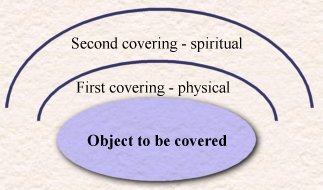
We see this repeatedly, not only in these four examples but in others as well; and will do well to consider its great significance. Additionally and very significantly, we find that when Yahweh God has to judge the "object" being covered, He must first remove the second covering, effect His judgment, and then recover the object with a substitutionary covering.
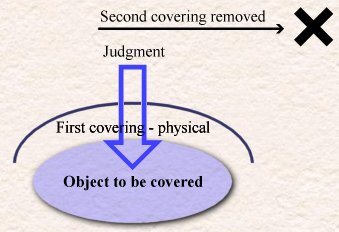
Then a substitutionary covering is set in place
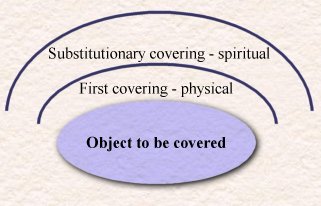
This substitutionary covering is essential to forestall further judgment. It is also temporary in nature and purpose, deferring to the eventual re-establishment of the original second covering. You will understand this better as we examine these four examples.
An important truth to note concerning these paired coverings is the Scriptural significance of the number "two." In the Bible, "two" indicates witness (as in the disciples going out in pairs, Luke 10:1-16), union (as in the two becoming one flesh, Matthew 19:5), and division or difference (as the Bible is divided into two testaments, on the second day of creation the waters were divided, or the first Adam – the natural – and the last Adam – the spiritual – 1 Corinthians 15:45-49). Coverings are indeed a witness, a union, and yet different – one physical and one spiritual.
![]()
The first paired coverings Yahweh created were the coverings over the earth. The first physical covering was the water in the clouds and in the sea.
He established the earth upon its foundations, so that it will not totter forever and ever. You covered it with the deep as with a garment [Psalm 104:5-6].
... who covers the heavens with clouds, who provides rain for the earth [Psalm 147:8].
As clothing covers our body, so the clouds and the sea cover the otherwise naked earth – affording it protection, as well as providing Yahweh's essential covering over His creation. While this first essential physical covering remains as a garment, there used to be another very important covering that, while still physical in structure, was detrimentally removed as a spiritual consequence of sin. When Yahweh created the earth, on the second day He created this second spiritual/physical covering over the earth.
Then God said, "Let there be an expanse [or, firmament] in the midst of the waters, and let it separate the waters from the waters." And God made the expanse [firmament], and separated the waters which were below the expanse [firmament] from the waters which were above the expanse [firmament]; and it was so" [Genesis 1:6-7].
As pointed out in Dr. Carl E. Baugh's book, Panorama of Creation, page 47ƒ, "The word used in the Hebrew to describe the firmament is 'ragiya.' Hebrew scholars recognize the word ragiya means to compress or pound out, and stretch out this arch of heaven in thin metal sheets. However, the elements used in the firmament are the elements of water." Dr. Baugh goes on to explain that the "firmament," or canopy, or covering over the earth was compressed hydrogen taking on near-metallic characteristics, formed in the middle of a solid water formation about eleven miles above the earth. This canopy, or covering, created a lush greenhouse effect, protecting the earth from the harmful affects of short-wave radiation from the sun. Therefore, this first covering set could be graphically viewed:
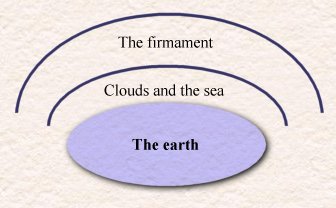
But as we have said, this second covering is spiritual in nature, and when man sinned Yahweh withdrew this protective covering, bringing the judgment of the flood, and even the post-flood shorter lives of today (not to mention other harmful affects of unfiltered sun rays).
And it came about after the seven days, that the water of the flood came upon the earth. In the six hundredth year of Noah's life, in the second month, on the seventeenth day of the month, on the same day all the fountains of the great deep burst open, and the floodgates of the sky [or, windows of the heavens] were opened [Genesis 7:10-11].
When Yahweh removed this protective covering, the windows of the heavens were opened with consequential judgment. During the millennial reign of Yahshua, when He brings man into His sabbath rest, He may very well reestablish this original second spiritual covering, returning full circle to the conditions which existed in the days of Adam and Eve.
Since Yahweh removed the second covering in order to effect judgment, it was then necessary that He restore a substitutionary covering over the earth to abate further judgment. Thus, He placed over the earth the substitutionary covering we call the ozone layer. If this covering was removed, the earth, once again, would be judged. This is very plain to see from the news we hear about the deterioration of the ozone layer.

![]()
The second pair of coverings are rather
interesting and bear an exceptionally relevant message
for us today. These are the coverings over our spirit and our soul.
We see the establishment of these coverings
likewise in the first days of creation; but the clarity
of the first physical covering is actually revealed
in the New Testament. The first physical covering of
this second pair is man's body:
"Then Yahweh God formed man of dust from the ground, and breathed into his nostrils the breath of life; and man became a living soul" [Genesis 2:7].
The body is the physical covering for the man's spirit and soul. This covering is confirmed in 2 Corinthians 5:1-4:
For we know that if the earthly tent which is our house is torn down, we have a building from God, a house not made with hands, eternal in the heavens. For indeed in this house we groan, longing to be clothed with our dwelling from heaven; inasmuch as we, having put it on, shall not be found naked. For indeed while we are in this tent, we groan, being burdened, because we do not want to be unclothed, but to be clothed [or, covered], in order that what is mortal may be swallowed up by life.
Our spirit and soul is clothed with the garment of our physical body. We do not usually think of our body as being a covering, or clothing, but the Scriptures reveal that indeed it is. The validity of this first physical covering is not only confirmed in 2 Corinthians 5, but also by the presence of a second spiritual covering. And herein lies a very important and relevant message for us today.
The spiritual nature of the second covering is first established by the absolute spiritualness of the original second covering – Yahweh's glory. When Adam and Eve were first created, Genesis 2:25 tells us that they "were both naked and were not ashamed." It was not until they sinned that their nakedness was evidenced. Adam then replied to Yahweh when He was seeking him: "I was afraid because I was naked" (Genesis 3:10). What made the difference?
In Psalm 104:1-2 we read: "O Yahweh my God, you are very great; You are clothed with splendor and majesty, covering Yourself with light as with a cloak." Before Adam and Eve sinned, Yahweh was their covering, taking full responsibility for them; and whether literally or simply governmentally, they were clothed by His splendor, His light.
Thus we see this second covering example:

But when Adam and Eve sinned they became naked, evidenced to them in their own eyes. This spiritual covering – the light and splendor of Yahweh – was removed. Therefore, as in the first case concerning the earth, once again the absence of the second covering demanded judgment. Adam and Eve were judged, but their nakedness (the absence of the second covering) necessitated the placement of a substitutionary covering. Therefore, Adam and Eve "sewed fig leaves together and made themselves loin coverings" (Genesis 3:7). Then, in a hope-filled foreshadowing of Yahshua's second work in His kingdom, Yahweh slew an animal and "made garments of skin for Adam and his wife, and clothed them" (Genesis 3:21). Thus, we see that clothing replaces Yahweh's splendor or light as the second covering.
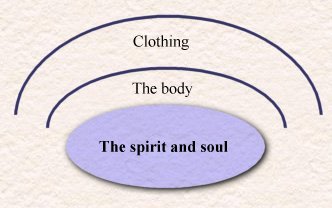
In like parallel, we find in 2 Corinthians 3:7-11 that when the glory that covered Moses' face faded, similarly the appropriate response was for Moses to veil, or cover, his face with a cloth. His "nakedness" in the absence of Yahweh's glory, as with Adam and Eve, necessitated a substitutionary covering.
We see then that clothing is distinctly spiritual in function, providing a substitutionary spiritual covering for the original splendor that had covered man. And as further evidence of this spiritualness, when this mortal flesh, our body, is "swallowed up by life," again our bodies – made new and imperishable – will be clothed by Yahweh in white and brightly shining robes (Revelation 7:9, 13, 14). Thus we see that our clothing is intrinsically spiritual in nature and should be worn in a manner so as to represent this.
Do you see now the spiritual position of this
second substitutionary covering – clothing? We do
not think of it as spiritual, but it is very much so!
This is certainly something that Yahweh and His angels recognize and
respond to. Considering this, let us then digress here momentarily and
seize upon some important insight regarding the relevance
of modesty in dress.
We see clearly that our physical clothing actually bears a great substitutionary purpose. Like the ozone layer, it is indeed an interim spiritual covering – covering man from the time of the fall up to that moment when once again Yahweh will restore the original covering and men will be clothed in and by His splendor.
Since our clothing is a substitutionary
spiritual covering, we should wear it in such fashion as
to restrain from flaunting our fallen nakedness by exposing
or revealing our bodies in a shameful and unreasoning way. We should
be compelled to hide our shame and refrain from taking
our substitutionary spiritual covering and yielding
it to worldly and seductive fashion that leads one astray from truth and
what is right. Clothing is a spiritual covering that is to effect modesty,
not a picture frame drawing attention to our fallen flesh!
Its spiritual significance should be respected,
covering our body in such measure and style as
befits the original covering. As a substitute for Yahweh's
splendor and a prelude to the yet-coming robes of righteousness,
let clothing be worn in modesty, humility, and godly
restraint, not giving ourselves to worldliness. If
our resurrected righteous bodies will be fully
covered with a robe, and if Yahshua's own glorious
body is covered with a robe "reaching to the
feet" (Revelation 1:13), how much more should we cover
the sinful shame of our flesh (Romans 7:16f) with modest
clothing?
Inasmuch as we are called to give glory to God in our bodies (1 Corinthians 6:20), in like manner let us give Him glory in our spiritual body-covering – clothing. Ask yourself: Is my spiritual covering of clothing in keeping with the modesty, order, and thoroughness of Yahweh's splendor? If not, then as Yahweh did so for Adam and Eve, you need to change and increase your covering.
|
Why should our garments
made to hide When first she put
the covering on, How proud we are,
how fond to show The tulip and the
butterfly Then will I set my
heart to find No more shall worms
with me compare, It never fades, it
never grows old, In this on earth would
I appear, |
And before examining the next covering pair,
one final point needs to be added. Recognizing the
spiritual nature of this second covering – clothing
– which is the replacement covering for the splendor and
light of Yahweh, it is entirely inappropriate for
anyone to depict animals in human characterizations,
covering them in Yahweh's spiritual covering. Animals
will never be clothed in the splendor and light of
Yahweh, which is clothing's promise. To place clothing
on humanized animals will never elevate animals; but instead,
reduces humans to beasts and is an insult and shame to
Yahweh's spiritual covering, which He personally placed
upon man. Yet man, in keeping with his fallen ways,
turns around and places that covering of promise on the
creature.
![]()
The third pair of coverings is over the ark of the covenant, which contained Yahweh's Law. The Law is impossible for man to keep while in his flesh, and needs a covering. It exposes our nakedness before Yahweh God. Thus, the first physical covering necessitated by the Law was the mercy seat with the covering cherubim.
And the cherubim shall have their wings spread upward, covering the mercy seat with their wings and facing one another; the faces of the cherubim are to be turned toward the mercy seat [Exodus 25:20].
For the cherubim spread their wings over the place of the ark, and the cherubim made a covering over the ark and its poles from above [1 Kings 8:7].
And where there is one covering, Yahweh bears testimony to His presence (or His judgment when withdrawn) by a second spiritual covering. Let us see what this second covering was.
And he [Aaron or the high priest] shall put the incense on the fire before Yahweh, that the cloud of incense may cover the mercy seat that is on the ark of the testimony, lest he die [Leviticus 16:13].
This second spiritual covering, revealing Yahweh's presence, was the cloud of incense. The third pair of coverings we see then is the mercy seat with the covering cherubim and the cloud of incense. Thus, we find the third covering example to be graphically represented as follows:
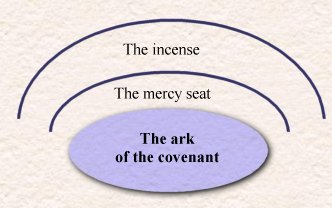
And like the firmament over the earth, or the glory of Yahweh on Adam and Eve, the removal of the incense likewise meant judgment and death. We read in the subject passage that if the incense covering was not in place then the priest would have been judged unto death.
And once again we find that removal of the second spiritual covering demands a substitutionary covering. When the tent was moved and the incense had to be removed, Yahweh required that "a cloth of pure blue" be placed over the ark as an interim covering (Numbers 4:1-6). Not only was this interim blue cloth covering placed on the ark, but a like cloth was placed over the table of the bread of the Presence, the lampstand, the golden altar of incense, and all the associated utensils. All the items of the temple were covered in some fashion while in transport; and if anyone uncovered them and they were looked upon, it meant the transgressor's death. Interim substitutionary coverings, as we can see, are very significant!
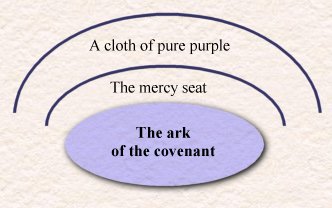
![]()
Housing for the ark of the covenant revealed yet a fourth important pair of coverings. These are the coverings over the tabernacle. The physical first covering over the tabernacle was a tri-layered tent. It included the first layer of goat's hair, covered by ram's skins died red, and topped by porpoise skins. This special tri-layered covering afforded physical protection for the tabernacle from the heat and rain.
And the overlapping part that is left over in the curtains of the tent [made of goat's hair], the half curtain that is left over, shall lap over the back of the tabernacle. And the cubit on one side and the cubit on the other, of what is left over in the length of the curtains of the tent, shall lap over the sides of the tabernacle on one side and on the other, to cover it. And you shall make a covering for the tent of ram's skins dyed red, and a covering of porpoise skins above (Exodus 26:12-14).
In the second covering over the tabernacle is the most dramatic testimony to the spiritual nature of this second covering. Covering the tabernacle was Yahweh's presence – a cloud by day and a pillar of fire by night.
Now on the day that the tabernacle was erected the cloud covered the tabernacle, the tent of the testimony, and in the evening it was like the appearance of fire over the tabernacle, until morning (Numbers 9:15).
Thus we find in this fourth example:
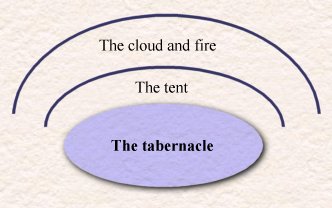
This second vital spiritual covering afforded the Israelites protection, light, and guidance. And if this spiritual covering was removed, like the others we have seen it too would have meant the Israelite's death and destruction in the wilderness.
If the ark of the covenant had an interim
covering when in transport, then when the cloud was removed
to indicate the time to move, do we find an interim substitutionary
covering over the tabernacle? There had to be one! If not,
then unmerciful extended judgment would have been required
on the Israelites while they journeyed.
In the same chapter detailing the required
substitutionary coverings of the temple objects during
transport, Yahweh tells Moses that he is to number,
or take a census, of those men who serve in the
tabernacle and its transport. In and of itself, this
alone does not seem significant. But in Exodus
30:11-16 we saw that Yahweh required that anytime a
census was taken, all those who were numbered were
required to "give a ransom for himself to Yahweh ... that
there may be no plague among them when you number them."
The "ransom" to be paid was a half shekel
that was given "for the service of the tent of meeting."
However, the ransom of a Levite was ten times that amount,
or five shekels – Numbers 3:44-51. This ransom was very
significant in that it served as the legal
substitutionary covering over the tabernacle.
How can we say this required numbering of these Levites with the resulting ransom money was in fact an interim covering? Very simply. First, note that its payment was to avert Yahweh's judgment by a plague. And second, very clearly, He calls it a covering. In Exodus 30:16, the ransom is specifically identified as "atonement money." As we learned in the previous chapter, the word "atonement" literally means – covering. Thus, this census money was "covering money." The ransom money for those men who served in transporting the tent was an interim substitutionary covering over the tabernacle and the men themselves.
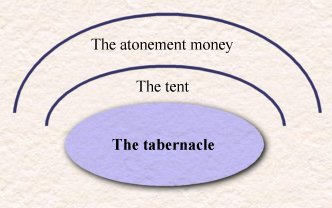
Let us now summarize these four highly
revealing, extraordinarily consistent, and individually
entirely intact and repetitive examples of the government
of coverings. And further evidence of this remarkably
repetitive pattern is presented in the following
section and in the next chapter as well.
Object to be Covered |
First Covering |
Second Covering Removed to Effect Judgment |
Substitutionary Covering |
| The earth
Man's soul and spirit The ark of the covenant The tabernacle |
The clouds and the sea
The body The mercy seat The tent |
The firmament
Yahweh's glory The incense The cloud & fire |
The ozone layer
Clothing A cloth of pure blue Atonement money |
![]()
With these four clear examples of paired
coverings, and in each case there is a substitutionary
covering, let us now go to the New Testament and examine
a fifth pair of coverings. Very importantly, this is the covering of
a man or woman's head, which speaks of governmental headship.
Hair on a man or woman's head is strikingly the first covering. As one might suspect, we will find that this head-covering speaks to a very important governmental issue of headship. While there are no specific scriptures that exactly say the hair "covers" the head (as we find in all four of the preceding examples), as in the case of each of these other coverings, this is indeed an unarguable fact. But more specifically, we will see that the vital spiritual second covering very clearly establishes the hair as the physical first covering. Because of men's divergent ideas and confusion on the text we will be addressing, and because of the important relevance of this set of coverings today, of necessity we will devote considerable attention to this fifth pair of coverings.
Having already stated that the first covering of the head is hair, let us now consider the second spiritual covering. In 1 Corinthians 11:3-5 we read:
But I want you to understand that Christ is the head of every man, and the man is the head of woman, and God is the head of Christ. Every man who has something on his head while praying or prophesying, disgraces his head. But every woman who has her head uncovered while praying or prophesying, disgraces her head; for she is one and the same with her whose head is shaved.
We find then a headship line with the following order:
Yahweh God
Yahshua
The man
The woman
This headship order greatly influences this matter of coverings – establishing and requiring a line of different heads, providing literally different heads to cover – a woman's and a man's – and thus necessitating different coverings, both the first as well as the second. The head, or covering, of Yahshua is Yahweh; the head, or covering, of the man is Yahshua; and the head, or covering, of the woman is the man. The first physical covering of hair (differing in lengths for the man and the woman) is covered by the second spiritual covering – the head, or authority, of each, as established in Yahweh's headship order. Let us equally lay out these two differing sets of coverings for better understanding.
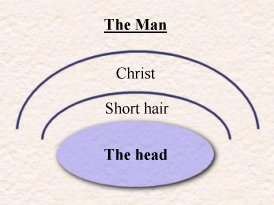
|
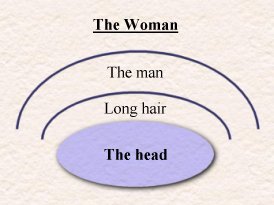
|
Thus, as we just read, when the man prays to Yahweh, he cannot have something on his head or hair. This would be a disgrace to Yahshua, as He is his covering. In verse seven we further read: "For a man ought not to have his head covered, since he is the image and glory of God ...." We have already seen the significance of this scripture as it relates to the man's unique place as the image of God. Now, in context, we see it gaining even more significance as we understand that the man not only bears the Father's image; but also, is positioned directly under the authority of His Son. And as the one who shares His image, the man also shares His governmental authority. Thus, in man's unique position, he cannot have any other covering, or "authority" (as is used in reference to the woman in verse 10), over his first covering, his hair, or he shames Yahshua, his headship covering.
There will be many questions arising that
require our thorough examination concerning the covering
of the woman. These will be addressed, but let us
begin with the clear and simple matter of her first
covering – her hair.
Both the man's short hair and the woman's long hair demand a second covering. But as Paul makes issue of in 1 Corinthians 11, the woman's longer hair gives testimony that Yahweh has likewise given the woman a different head, or covering, from that of the man. These differences between the man and the woman necessitate entirely different coverings, while still conforming to His established covering pattern. In all four previous examples, the item being covered is one item. Yet when it comes to the heads of men and women, there are two distinctly different heads – the man's and the woman's. With these two different heads, Yahweh sets in order two different first coverings – short hair and long hair.
And most importantly, these two different first coverings of long and short hair exist to further give testimony to the two different second coverings. Thus, we have seen that the governmental head, or covering, of the man is Yahshua; and the governmental head, or covering, of the woman is the man. This matter of differing hair lengths is therefore very important, and helps us to understand why Paul taught that "if a man has long hair, it is a dishonor to him" (vs. 14). If a man has long hair like a woman, his longer hair ceases to give testimony to Yahshua as his head. This difference is thus very important in this headship and covering matter.
In 1 Corinthians 11, Paul begins by establishing
Yahweh's headship order, including the man's covering
over the woman. And he does so with the clear purpose of addressing
the issue of a cloth veil, or headcovering, on the
woman. By establishing the man's covering for the woman,
he thereby sets forth Yahweh's order and government, as well as the need
for the woman to cover her head when praying or
prophesying.
Likewise, this difference in hair length is used by Paul to further argue the differing ways in which men and women either speak to God – prayer – or speak on behalf of God – prophecy. Again, it is important to note, and worthy of our restating, that hair length is brought up here by Paul as an argument to show that there is a distinct difference in the way men and women go to God. This distinction is introduced by Paul's immediately preceding question: "Judge for yourselves: is it proper for a woman to pray to God with head uncovered?" His answer: No, there is a difference in the proper way for men and women to come to God in prayer, even as there is a difference in their primary coverings – their hair. (We will address the mistaken idea that the woman's hair is her second covering.) So, why is it improper for the woman to go directly to Yahweh in prayer without her head covered? Let us see what Paul said in verse five.
But every woman who has her head uncovered while praying or prophesying disgraces her head, for she is one and the same as the woman whose head is shaved.
We see that when a woman prays or prophesies without her head covered, she disgraces her head. This is very important to note. Why is it that she disgraces her head, or her husband or father as it may be? Because clearly, no longer is she going to her head in the proper headship order; but now, she is going above, or around, her head to her head's Head. She is now speaking directly to her husband's head, and is uncovered.
|
Let us try to relate this in a natural comparison. If an employee on a job was concerned about or desirous of something, and instead of going to his boss he went around him to his boss's boss; in most employment situations where there are closely observed lines of authority, he would be, literally, out of order. The normal course of his appeal would be to go directly to his head, or boss, and not to his boss's boss. Such it is with the authority, or headship, of Yahweh. When the woman goes directly to Yahshua in prayer, she is now going around her husband, her head, to her husband's head, his Boss.
The difference between this example and our approach to, or ministry from, Yahweh is that "there is neither Jew nor Greek, there is neither slave nor free man, there is neither male nor female; for you are all one in Christ Jesus" (Galatians 3:28). All – male or female, Jew or Greek, slave or free – have open, direct access to Yahweh and His kingdom. Yet, this equal access to Him does not nullify His order of headship, His government. When it comes to headship and covering government, the woman is to freely go to Yahweh, but specifically under the covering of a veil. Why? Let us look further.
We have already noted the clear distinctions
Yahweh has set in place regarding the first and
second coverings of the heads of men and women: men wear
short hair (the first covering) covered by Yahshua (the second covering),
and women wear long hair (the first covering) covered
by the man (the second covering). But now, what happens when
that order is changed and the woman goes to her head's
Head – Yahshua? She is no longer under his covering,
but is now governmentally appealing directly to Yahshua.
To help understand this, let us consider another example.
This appeal is the same as if you had gone to court under state law; and then, for one reason or another, legally changed your appeal to a higher court under federal law. When you were in state court, you made your appeals under state government. But now, you remove yourself from that government and appeal to a higher government. Your appeal is now not made under state law but under federal law. You are still under the law, but now a higher law. (This example has its limitations when comparing the government of Yahweh with the government of man, although we can benefit and aid our understanding by using this comparison.)
When the woman likewise prays to Yahweh, He sees
or hears her appeal (since both male and female
can come to Him), but in His governmental order
He has a major concern. The woman's appeal is no longer
under the covering or appeal process of her husband.
Now, the woman is directly going to Him. The husband
cannot cover his head before Yahweh, for Yahshua is his covering.
His appeal process is clearly laid out in the Scriptures
– when he goes to Yahweh, he is to appeal to Him
under his covering – Yahshua. But the woman, Paul says,
must go to Yahweh with her head covered. Why? Because
the woman is no longer under her covering, her husband.
Therefore, she is uncovered before Yahweh and
His angels. What does she need? She needs a substitutionary
covering.
This is the identical substitutionary process we saw in all four of our previous examples. The similar fact is – her covering is not there as she appeals outside of her husband and goes directly to his covering, Yahshua, or to the Father. This lack of a covering demands judgment from Yahweh; therefore, He says to the woman: When you pray or prophesy, cover your head with a substitutionary covering representative of the covering of your husband. Governmentally, there can be no exception to this, even as Paul declared to the Corinthians: "But if one is inclined to be contentious, we have no other practice, nor have the churches of God" (vs. 16). Thus, Yahweh's covering pattern for the woman when she goes to her head's Head is as follows:
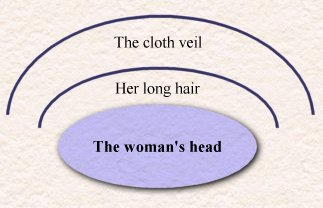
Let us now look at the identical application of this truth as we go up the headship order. This "no other practice" of head-covering applies to man (or even to the woman) as he appeals up the line of authority, or headship. Yahshua said:
"And in that day you will ask me no question. Truly, truly, I say to you, if you shall ask the Father for anything, He will give it to you in My name. Until now you have asked for nothing in My name; ask, and you will receive, that your joy may be made full. ... In that day you will ask in My name, and I do not say to you that I will request the Father on your behalf; for the Father Himself loves you, because you have loved Me, and have believed that I came forth from the Father" (John 16:23-27).
This is a wonderful parallel, or repeat, of the very order
we see when the woman goes directly to her head's
Head, when now the husband is not making request to Yahshua
on her behalf, but the woman herself. Yahshua says: "You
have full right to go directly up the headship line
to the Father because He loves you. But, when you go to
Him, approach Him under My authority by asking 'in My name.'"
The "in My name" is the covering of the man
under Yahshua (or the woman whose head is covered)
that allows him to go to the Father.
In this covering process, what could be clearer than when the woman goes to Yahweh, she is to follow the same covering authority that Yahshua provides for our appeal to the Father? The only difference is (and we have learned that differences are definitely in order when headship is at issue) – the covering of the man is Yahshua, and "in His name" he makes his upward appeal; but for the woman, her covering outside of her husband is a veil over her head (and hair), and under this veil she makes her appeal. The woman's covering is physical, with governmental authority (we will examine this next), while the man's covering is spiritual, under the authority of Yahshua. We can graphically lay out this order of headship and the substitutionary covering in the following way. But keep in mind, this diagram is presented to reveal the similarity in pattern, and does not imply that the woman does not pray to the Father "in Yahshua's name."
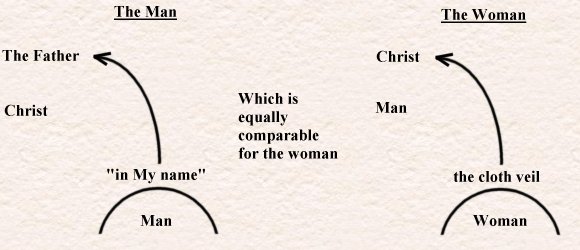
And in completing this examination on authority and headship, we see that Yahshua most certainly knew who was His covering and authority. He could make no appeal higher than His Head, the Father. Yet when He spoke to man, He spoke under that authority, or covering, of His Father – "the works that I do in My Father's name, these bear witness of Me" (John 10:25).
Thus we see, from the woman to Yahweh, headship order,
and the coverings they provide, are vitally important.
Women need to cover their heads when praying or prophesying,
and wear long hair; while men cannot cover their heads when praying or
prophesying, and need to keep the primary first covering
not only short on their heads, but also present on
their jaws, a part of the head.
Authority
So when is a woman to wear a headcovering? Is it just when she enters a group-gathering? No. The headcovering is not for man to look at. The woman should wear a covering upon her head anytime she prays or prophesies. If she prays in the privacy of her home, or even in her car, she comes before God and should cover her head. If she is in public and prays, she should cover her head. Does not a man take his hat off when there is prayer at any time or location? Likewise, a woman should cover her head when there is prayer at any time or location. By doing such, she places substitutionary "clothing," a covering, or authority, on her head that says to Yahweh and to the angels: "I come to my husband's Head with respect for and under his authority." According to Yahweh's word, to do otherwise is to shame her head – her husband or father.
Very significantly, let us look at the meaning of the word "authority" as used in 1 Corinthians 11:10.
Therefore the woman ought to have authority on her head, because of the angels.
The Greek word here translated "authority" is "exousia." What is this "exousia" that a woman needs on her head? W.E. Vine's Expository Dictionary records the following about "exousia": "From the meaning of leave or permission, or liberty of doing as one pleases, it passed to that of ability or strength with which one is endued, then to that of the power of authority, the right to exercise power, e.g., Matthew 9:6; 21:23; 2 Cor. 10:8 ...." Additionally, it is to be noted that the word "symbol" is erroneously and shamefully added to this verse in some translations, for it does not even exist in the Greek text. The statement here is direct and simple – the woman's headcovering is authority!
How much clearer Paul's usage of this word "exousia" becomes regarding the headcovering for the woman when one understands the purpose of the covering – as a substitutionary covering for her head when she appeals to her head's Head. The woman's headcovering is thus liberty, strength, the right to exercise power, the power of authority to speak to her head's Head, or to speak on behalf of her head's Head. The woman's headcovering is the substitutionary second covering giving her authority to speak to and on behalf of Yahweh.
Some would disregard the woman's headcovering as nothing more than a piece of cloth; but we find it is much more than that. What is clothing? Is it likewise nothing more than mere cloth? No, for we have seen that clothing is a spiritual covering we wear in hope of its promise that once again we will receive Yahweh's glory. It is a legal covering which Yahweh personally provided to the first couple on this earth. In truth, clothing is a covenant, a promise that Yahweh has made to man that He will once again cover him with His glory. It is an interim covenential covering that assures us that Yahweh will restore all that we lost.
Equally, the woman's headcovering is a covenential covering that bears tremendous prophetic meaning (as we will see in chapter 8). It is far more than simply a piece of cloth, but is literally authority on the woman's head when she comes before Yahweh. In Yahweh's government and order, the woman's headcovering is the covenant that the woman can be accepted before Him with the like access of the man, whose head is Yahshua. Yes, the cloth headcovering (like the cloth of pure blue, or clothing, or even the tent) is made of material; but, in the government and ways of Yahweh, it is covenential authority before Him and His angels.
What is a contract, or a traffic ticket, or a dollar bill,
or even the Constitution of the United States? Are these only pieces of
paper? No, because they have governmental
authority behind them. What is water baptism?
When one enters into water baptism, are they
simply taking a bath in their clothes? Of course not!
When one enters into the waters of baptism, that water
becomes an entrance into death with Yahshua and His resurrection. Though
it may only be water, it too becomes a covenential
element that one enters into. When backed by Yahweh's government,
the natural becomes spiritual – or in the case of the woman's headcovering,
even authority. Though the woman's headcovering may appear
to be only be a piece of cloth, in Yahweh's government
it is covenential authority!
Intrinsic Consequences
To confirm the presence and purpose of the
woman's substitutionary headcovering, let us briefly
review the removal of the earth's spiritual covering.
As we saw, in the beginning the earth was covered
with a second spiritual covering – the firmament. But
in order to effect judgment, Yahweh removed that covering
at the flood. Even as His judgment of Adam and Eve was
preceded by the removal of His splendor, yet followed
by the establishment of the substitutionary covering of
clothing, so the removal of the firmament was
followed by the establishment of the substitutionary
covering of the ozone layer.
Whereas the superior firmament was a fully protective covering before the flood, the substitutionary covering of the ozone layer yet provides the earth with an essential protective covering, averting pain and death for the earth and its inhabitants. And obviously, the removal of this substitutionary second covering would mean further judgment, harm, and death. Much attention is being given to the warnings concerning adverse affects from a thinning ozone layer. Why? In truth, a substitutionary covering would be removed. Likewise, the removal of clothing from the body is a consequential uncovering followed by the destruction of society with its loose morals.
The judgment from the removal of these two substitutionary coverings is evident. But to our sorrow we fail to recognize today the corollary significance and like judgment that comes from the removal of the substitutionary covering to be worn on a woman's head. Let us not be naive. Just as there were and are obvious adverse affects from removing the substitutionary coverings of the ozone layer, clothing, the cloth of pure blue, and the atoning ransom money; there are equal, inevitable judgments and destructive consequences for women, the family, society, and the church when women do not cover their heads. A covering affords God-given protection, or atonement. And by not covering her head, the woman abandons that protection, and judgment is inevitable. We cannot escape Yahweh's judicial consequences! In truth, coverings are not a choice. They are not optional additions that can be debated and discarded at one's will! They will either be in place, or judgment is certain!
Who would go above the ozone layer and say: "The sun will not harm me!"? Or who would go naked and say: "I won't be affected by this!"? Then why do men and women say today: "A woman can pray or prophesy with her head uncovered without any ill consequences!"? The judgment of such error is just! "Can a man take fire in his bosom and his clothes not be burned? Or can a man walk on hot coals and his feet not be scorched" (Proverbs 6:27-28)? One only has to look at the condition of the home – the children and marriage relationships – at society and at the church to say: something is woefully wrong! Yes indeed – the woman goes to Yahweh uncovered, and the man uncovers his jaw. Both of these are of grave prophetic and governmental significance, evoking Yahweh's certain judgment.
One might ask: Is Yahweh mad when someone fails to practice these coverings? No, but that does not change the consequences of disobeying His laws and ways. Yahweh may not be mad, but that does not change the ill outcome of our failures or His disfavor with us. Is Yahweh mad when someone jumps or even falls out of a building and plummets to the ground? Of course not. But neither does He change His law of gravity for the person. The law of gravity is intact; and when one tests that law to their detriment, Yahweh is not mad. It is simply that the violation of His law, or way, has resulting adverse consequences. Such it is with His coverings. Yahweh may not be mad when a man shaves his beard off or the woman refuses, or even fails, to wear the headcovering; but, one can be certain that there will be adverse consequences. He does not change His laws and ways to accommodate our failure or even ignorance.
This matter of coverings is not the ideas and
laws of man. This is Yahweh's consistent order and ways
from the foundation of the earth that the angels recognize and respond
to. If we are wise and discerning, we will follow His
ways. Obedience cannot be a matter of choice or
selection. As we have seen, Paul completed his
instruction on this matter with these concluding
remarks: "But if one is inclined to be contentious,
we have no other practice, nor have the churches of God."
How fitting a closure provided on this
subject. Paul could not have known the prevailing
contentions offered by men and women today on this
issue. Or could he? Maybe it was similar enough in
his day so as to spark this exhortation. Only today,
in shameful contrast one has to look far and wide to find
those who abide in Yahweh's word on this important
governmental order. And today, to see the
consequences of the failure to cover the woman's head
(and the man's jaw), all one has to do is open their eyes.
Christians are careful to use the words "in Jesus' name"
at the end of their prayers, yet they nullify that very
truth concerning headship and being properly covered by
not honoring the Scripture's equal instruction
concerning the woman covering her head!
Let Her Head Be Shaved
In 1 Corinthians 11:5 we read: "But every woman who has her head uncovered while praying or prophesying disgraces her head; for she is one and the same with her whose head is shaved." If the woman prays or prophesies without her head covered; first, she disgraces her husband by speaking to, or for, Yahweh, which is her head's responsibility; and second, she is speaking as though she were shaved, or bald, before God and man (which is a shame). Her absence of the second necessary spiritual covering – the veil – demands and gives testimony to the removal of her first covering – her hair. If the second covering is set aside, then truly she might as well remove the first covering. She is uncovered, even as were the Egyptians who religiously shaved their heads.
Our purpose here is to not only address the importance of women obediently covering their heads when they pray or prophecy, but also to see the importance of the hair on a man. The weight and significance of this matter regarding the beard on a man's face is made clearer when we see the consequential evidence addressed here to women. Both are God-ordained coverings. Paul goes on to say in verse six: "For if a woman does not cover her head, let her also have her hair cut off; but if it is disgraceful for a woman to have her hair cut off or her head shaved [and it was, and is], let her cover her head." What Paul is saying here is: If you are going to remove the second spiritual covering, then you might as well remove the first covering also.
It is thus foolish to say, as do those who
conform moreso to worldly styles than to God's word, that the woman's
hair is both coverings – her first physical covering
as well as her second spiritual covering. This is
not the case for the man, and neither can it be for
the woman. This is not the case in any of the other
four examples, and neither can it be for the woman.
The first physical covering of the woman's hair in fact
gives testimony to the necessity of the
second spiritual covering – in this case bearing
testimony to headship. Nevertheless, some people say
the woman's hair is her covering, in lieu of a cloth
covering over the head. They base this solely on 1 Corinthians
11:15: "For her hair is given to her for a covering." Let
us consider this error.
"Peribolaion" vs. "Katakalupto"
Certainly, the woman's hair is a covering; but as we have seen, its covering is in the same respect as the first covering of the man – physical. This is born out in the Greek word used here in 1 Corinthians 11:15 regarding the woman's hair wherein it is identified as a "covering," or "peribolaion." It is very important to note that this is an entirely different Greek word from all the other cases in this chapter in which the word "cover" and its derivatives appear. The Greek word used in each of these cases (set in bold in the following passages) is "katakalupto," not "peribolaion," as used in verse 15 describing the woman's hair. These distinctive word differences are clear proof that the woman's hair is not a "katakalupto," a fulfilling cloth headcovering.
But every woman who has her head uncovered while praying or prophesying, disgraces her head; for she is one and the same with her whose head is shaved. For if a woman does not cover her head, let her also have her hair cut off; but if it is disgraceful for a woman to have her hair cut off or her head shaved, let her cover her head. For a man ought not to have his head covered, since he is the image and glory of God; but the woman is the glory of man [vss. 5-7].
Judge for yourselves: is it proper for a woman to pray to God with head uncovered [vs. 13]?
"Katakalupto" means – to cover up or to cover wholly. This speaks indeed to the second spiritual covering which covers both the hair and the head, as we find in context. But the completely different Greek word in verse 15 – "peribolaion" – is a fitting expression regarding the woman's "long hair" first covering.
Does not even nature itself teach you that if a man has long hair, it is dishonor to him, but if a woman has long hair, it is glory to her? For her hair is given to her for a covering [peribolaion].
What is the position or purpose of the woman's long hair? It is the first covering on the woman's head that is used to physically cover, or clothe, the woman. Thus, as confirmed in the meaning of the Greek word "peribolaion," the woman's long hair is – "something thrown around or a mantle around the body" (W. E. Vines). The woman's long hair is a body-covering. The woman's long hair can literally come down and wrap around her like a garment, covering her neck, shoulders, and upper torso. Therefore, there is a distinct and obvious difference in these two "coverings" – the first covering being a woman's long "peribolaion," or "wrap around" hair that demands the need for the second covering, the head and hair "katakalupto," or "to cover wholly" (being a cloth veil over the woman's long hair, as addressed in verses 5-7 and 13). The first "wrap around" covering – the woman's long hair – demands the second "to cover wholly" covering – the headcovering. Therefore, the first can in no wise replace the second.
Likewise, if a woman's hair is her spiritual
covering, do you not see the foolishness that Yahweh would
have to instruct women to wear hair? Why would Paul devote
all of this account to instruct women to wear long
hair? Is it not obvious that the woman would wear hair
anyway, even long hair? But would she wear a cloth
covering over her glory without instruction? No!
Even with Yahweh's clear instruction, women still do
not wear this important spiritual covering. It is
not necessary for Yahweh to instruct a woman to wear
hair.
Furthermore, He would not instruct the woman to remove her spiritual covering (if it was her hair, as Paul instructed her to cut off), knowing that it would mean certain judgment. Also, keeping in line with this erroneous idea that the woman's hair is her covering, one must then conclude that the man would have to shave his head when he prayed (which is forbidden in the Scriptures) in order to not have this covering of hair on his head. Likewise, why would Yahweh tell a woman to wear long hair specifically when she comes before Him? It is absurd to think that Paul’s instruction would be directed regarding these specific times of prayer and prophecy as though a woman could put on long hair one moment and short hair the next. Do you see not only the fallacy, but the total absurdity of this conclusion that the hair, even long hair, is the sole covering? If one takes this position, it totally falls apart on many counts, including when we see the pattern of paired coverings.
This truth concerning the need for the woman to cover her head and hair is thus exceedingly evident in the context of these verses in 1 Corinthians 11. A qualification of the hair as the spiritual covering before Yahweh is wholly impossible, affording a conflict to the preceding statements in verses five through seven. If the woman's long hair is her covering before Yahweh, why would Paul say to cover her hair, or else cut it off? This contradicts the hair being a spiritual covering!
And because this second covering of the veil
relates to Yahweh's governmental order and is covenential, its
application is thereby demanded and also recognized
by the ministering angels. Verse ten states: "Therefore
the woman is [lit.] obligated to have authority on her
head, on account of the angels."
The angels are beings of authority and under authority. They respect and thus respond to authority, thereby obligating the woman to act responsibly under this governmental order. Wearing a headcovering is not a choice, ladies; as clearly stated, “on account of the angels,” it is an obligation! Any woman praying or prophesying without this second spiritual covering is out from under the headship of her husband and despising Yahweh's divine governmental order.
This instruction, of course, equally defies people's arguments that the woman covering her head was and is only cultural. Clearly, this is not true, for Paul forthrightly stated that the woman "is obligated" to cover her head "because of the angels.” This is not cultural, but a clear command that is founded on Yahweh's government and responded to and administered by His angels.Let us here once again make a few comments
concerning the man's beard. We hope you are beginning
to see the significance and importance of both the
headship of man and the relevance of hair. But significantly,
unique to the woman and by Yahweh's governmental design,
the man bears hair not only on the top of his head,
but also on his jaw. This greater hair-covering bears unique testimony of
the headship and responsibility the man has for the woman.
Just as Paul cited the length of the woman's hair as a
testimony of her need to be covered, it can
equally be said that the quantity of hair-covering
on a man's head gives testimony to his increased responsibility
as the head of the woman and his household, as well as
the chosen mouthpiece for Yahweh.
But before we get too far from the testimony
of the woman, let us be cognizant of the fact that when men shave
off the hair of their heads, it too bears testimony
to the eradication or rejection of the second
covering and man's failure to effectively serve as
a head to his wife and family under Yahshua's headship. When the woman
did not abide under her cloth second covering,
her spiritual position was the same as being bald;
so Paul said, "you might as well shave your head." Now
similarly, the man has shaved his face, giving testimony
to the removal of his Head, or second covering, and
his own failure as head of his family and covered spokesman
for Yahweh.
This removal of a covering is a shame, even as it
is a shame for the woman to shave her head. It is
a shame and humiliation, even as it was in Old Testament
Scriptures when removal of the beard meant shame,
humiliation, and judgment. Yahweh removed the
first physical covering to reveal the removal of His
second covering, as well as His protection for His people. His removal
of their beards was soon followed by His removal of
the second spiritual covering, and thus came their judgment.
It is a shame in defiance of Yahweh's word, which
instructs a man to neither shave his head nor his
beard. It is a shame, giving reflective testimony
that a head without hair is a head without two
coverings.
Of course, we are not talking about natural balding; although it speaks prophetically. Yahweh did not say a man cannot go bald. Elisha was bald. But He does say a man should not "bald" himself with razor. What Yahweh may do, man may not! And we might say here that balding, the loss of hair, is undoubtedly a consequence of Adam's sin and the curse, which we are all under. This will be considered later.
The covering of the jaw of a man holds a unique testimony in itself. In the Scriptures, the jaw repeatedly represents the idea of strength. Samson, definitely a man of strength, picked up the "jawbone" of a donkey (also a representation of strength) and slew a thousand Philistines (Judges 15:14-17). A bridle placed in the jaw of a horse controls its entire strength (James 3:3). Yahweh gives testimony that He puts the bridle, or even hooks, in the jaws of entire nations and directs their strength (Isaiah 30:28, Ezekiel 29:4, 38:4). And by way of physical structural testimony, the jaw of a man, whose strength is 50 percent greater than the woman's, is larger and more pronounced.
|
WHEN SWORDS ARE TURNED INTO PLOWSHARES When the wolf dwells
with the lambkin, Can you imagine when
the righteous of God Will worldly cosmetics
be seen on the face And of those swords
that man does slay his face, I can't imagine a
world that's no different To criticism one may
contend that my concerns are external.
It may be His order
and ways I desire here on earth; So if you incline
to criticize or misunderstand my external
behavior, So of my loins I'll
keep covered from sight; My wife and daughters
have head covered likewise – So go on worldly Christian
about your way; |
Before closing this chapter on coverings, let us list a few conclusive biblical examples of the severe consequences of removing Yahweh's established coverings.
Thus, it can be conclusively stated that removing a covering is a reproachable act, calling for Yahweh's righteous judgment. Is it not then to man's shame and harm when men or women do not modestly cover their own nakedness? Are we not inviting Yahweh's just and wrathful judgment if we dress in such manner as to expose more and more of our nakedness? Are we not removing a covering that was given to cover our shame, not as a means to enhance "attractiveness" or seductiveness? Clothing is in fact a spiritual covering, and its removal before men, in part or in whole, is a call for Yahweh's judgment.
I was sharing with a sister in Yahshua about coverings, and she had a remarkable insight and response (which I frequently found her to possess). Concerning the issue of shame and humiliation associated with the tearing or removal of clothing as addressed in the Scriptures, her response was: "Isn't it interesting that man has a new name for humiliation – fashion!" That is a statement deserving much thought. What Yahweh establishes, man will seek to reverse. "Woe to those who call evil good, and good evil; who substitute darkness for light and light for darkness; who substitute bitter for sweet, and sweet for bitter!" (Isaiah 5:20). When removing the beard or clothing means shame, humiliation, and judgment; woe to those who conversely call it clean, honorable, attractive, or respectable.
|
SCRIPTURE'S EVIDENCE OF COVERINGS Poetry and prose fall
far short How can lines of a
man contain such wisdom When man does remove
that identifying mark Oh speak ye old Scriptures
who far surpass The mind of man plans
his way; How can we fathom
what there might be The jaw of a man is
set strong, hard to guide. A beard on a man is
more than pleasure to men: Hair on the head,
a beard on the jaw, Hide from us not,
by favor let us see, Pray, let us gasp
for truth with every breath we seize,
Let us abandon ourselves
with willful disdain And open ourselves
to unfathomed truth, Disdain not, tis my
humble plea, Consult God's word,
not the affairs of mankind Hair on the head,
and a beard on the jaw, And coming from heaven
with no due restraint, And now let us add
from Scriptures so dear, If you're so intent
to Scriptures disagree, Let man shave beard;
and why not shave head? And women, do not
wear a covering on your head. Take on the world.
Go ahead and be free! Fathers depart from
their role as a man. Children resort to
the image that parents, "No order!," Wisdom
declares, "You've sold it at market. "Things that flash,
for the moment to please; Fail not, oh Despair;
let your vengeance not lack! I know this poet,
(as poet he may be), It's not hair on the
face that makes a man. Let's not allow men
to come short Hark ye old man, to
yon Scriptures we bear, A beard is a covering.
God set it as true. |